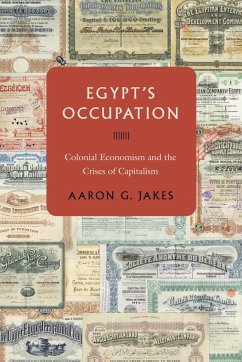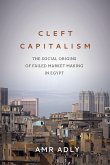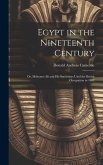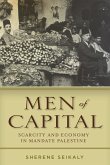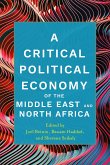- Gebundenes Buch
- Merkliste
- Auf die Merkliste
- Bewerten Bewerten
- Teilen
- Produkt teilen
- Produkterinnerung
- Produkterinnerung
"This book reexamines the political economy of foreign rule and the role of political-economic thought in the struggles over the character and status of the British occupation of Egypt after 1882 through its independence in 1922. The book traces a complex history of economism, a term that refers to the reduction of social phenomena to the play of economic forces, and the intermingling of economics and politics in the colonial Egyptian context. It overturns long-standing assumptions of Egypt during the period of British occupation, and deepens our understanding of global capitalism's…mehr
Andere Kunden interessierten sich auch für
![Cleft Capitalism Cleft Capitalism]() Amr AdlyCleft Capitalism156,99 €
Amr AdlyCleft Capitalism156,99 €![Egypt's Adjustment to Ottoman Rule Egypt's Adjustment to Ottoman Rule]() Doris Behrens-AbouseifEgypt's Adjustment to Ottoman Rule232,99 €
Doris Behrens-AbouseifEgypt's Adjustment to Ottoman Rule232,99 €![Egypt in the Nineteenth Century: Or, Mehemet Ali and His Successors Until the British Occupation in 1882 Egypt in the Nineteenth Century: Or, Mehemet Ali and His Successors Until the British Occupation in 1882]() Donald Andreas CameronEgypt in the Nineteenth Century: Or, Mehemet Ali and His Successors Until the British Occupation in 188239,99 €
Donald Andreas CameronEgypt in the Nineteenth Century: Or, Mehemet Ali and His Successors Until the British Occupation in 188239,99 €![Egypt's Other Wars Egypt's Other Wars]() Nancy GallagherEgypt's Other Wars35,99 €
Nancy GallagherEgypt's Other Wars35,99 €![Men of Capital Men of Capital]() Sherene SeikalyMen of Capital132,99 €
Sherene SeikalyMen of Capital132,99 €![A Critical Political Economy of the Middle East and North Africa A Critical Political Economy of the Middle East and North Africa]() A Critical Political Economy of the Middle East and North Africa144,99 €
A Critical Political Economy of the Middle East and North Africa144,99 €![Han Unbound Han Unbound]() John LieHan Unbound130,99 €
John LieHan Unbound130,99 €-
-
-
"This book reexamines the political economy of foreign rule and the role of political-economic thought in the struggles over the character and status of the British occupation of Egypt after 1882 through its independence in 1922. The book traces a complex history of economism, a term that refers to the reduction of social phenomena to the play of economic forces, and the intermingling of economics and politics in the colonial Egyptian context. It overturns long-standing assumptions of Egypt during the period of British occupation, and deepens our understanding of global capitalism's contradictions and the way that it defines and delimits notions of freedom, with implications that extend to the present day"--
Hinweis: Dieser Artikel kann nur an eine deutsche Lieferadresse ausgeliefert werden.
Hinweis: Dieser Artikel kann nur an eine deutsche Lieferadresse ausgeliefert werden.
Produktdetails
- Produktdetails
- Verlag: Stanford University Press
- Seitenzahl: 376
- Erscheinungstermin: 8. September 2020
- Englisch
- Abmessung: 230mm x 154mm x 28mm
- Gewicht: 612g
- ISBN-13: 9781503607194
- ISBN-10: 1503607194
- Artikelnr.: 57165165
- Herstellerkennzeichnung
- Libri GmbH
- Europaallee 1
- 36244 Bad Hersfeld
- gpsr@libri.de
- Verlag: Stanford University Press
- Seitenzahl: 376
- Erscheinungstermin: 8. September 2020
- Englisch
- Abmessung: 230mm x 154mm x 28mm
- Gewicht: 612g
- ISBN-13: 9781503607194
- ISBN-10: 1503607194
- Artikelnr.: 57165165
- Herstellerkennzeichnung
- Libri GmbH
- Europaallee 1
- 36244 Bad Hersfeld
- gpsr@libri.de
Aaron G. Jakes is Assistant Professor of History at The New School.
Contents and Abstracts
Introduction: Colonial Economism
chapter abstract
This chapter introduces two major arguments about the history of capitalism
in Egypt that animate much of the narrative that follows. First, prior
accounts of Egypt's "cotton economy" have focused on long-term continuities
in a global division of labor between agriculture and industry; this
approach has made the significance of financialization and other major
transformations in the global dynamics of capital accumulation harder to
discern. Second, methodological debates about economism have largely
obscured the role economism has played as a form of social thought inside
the history of capitalism itself. By reconsidering economism as a problem
internal to liberal thought, the chapter then explains the occupation's
discourse of "colonial economism" as a particular variant that treated the
relationship between the economic and the political in terms of a
developmental progression. Liberal political economy, on this
understanding, could apply in a country like Egypt; liberal political
theory could not.
1Infrastructures of Occupation
chapter abstract
This chapter recounts the spectacular elaboration of rural infrastructures
that nearly all contemporary observers identified as the primary focus of
the British occupation in its first decade. According to the accounts of
Egypt's recent history that informed this initial phase of British policy,
bankruptcy was a predictable consequence of the "despotism" that had
tainted every aspect of the old regime. For years, the British claimed, the
khedivial dynasty and a privileged class of rural notables had monopolized
the fabled resources of the Nile Valley and squandered that vast natural
bounty to line their own pockets. By reconfiguring the state as a more
perfect instrument for the increase of agricultural wealth, the occupation
would unleash the extraordinary productive potential of Egypt's peasant
majority. In targeting the smallholding peasantry as the chief
beneficiaries of "British justice," this program of infrastructural
development gave colonial economism a tangible form in the rural landscape.
2Egypt's Colonial Interior
chapter abstract
This chapter identifies the British takeover of the Ministry of Interior as
a defining moment in both the colonial reconfiguration of state
institutions and the emergence of a coordinated opposition to British rule.
The overhaul of the provincial administration that followed the appointment
of a British adviser to the Interior in 1894 aimed to evacuate politics
from village life. In place of customary village elections, the British
imposed a hierarchical system of administrative appointments that would,
they promised, make local officials into faithful bureaucratic agents of
agrarian reform. But as they wandered the countryside, the network of spies
working for Khedive Abbas Hilmi II instead documented what they saw as a
deterioration of the mores upon which good government had once rested.
Keenly sensitive to the occupation's emphasis on monetary gain, their
ribald accounts of drunken shaykhs, lecherous judges, and absentee
governors cohere as an early critique of colonial economism.
3Fields of Finance
chapter abstract
This chapter charts the making of Egypt's fin-de-siècle financial boom. The
earliest British efforts to attract foreign financial investment rested
upon a controversial assertion that Egypt's peasants possessed a basic
economic rationality that would allow them to employ mortgage loans as
productive capital. By the late 1890s, credit experiments and tax reforms
had together generated a mass of new, standardized data about the value of
landed property and the extent of the country's mortgage debt. On that
basis, a growing crowd of European investors began to calculate that Egypt
could offer safe and substantial returns on their idle capital. The
country's new financial sector mushroomed, and property values soared. Yet
even as the British hailed "the Egyptian boom" as proof of the occupation's
success, this wave of financial investment and speculation amplified the
very rural inequalities colonial officials had promised repeatedly to
alleviate.
4Gilded Speech
chapter abstract
This chapter takes up the challenge that Egypt's financial boom posed to
the country's fledgling nationalist movement. Confronted with a discourse
of economic improvement that appeared to be succeeding on its own terms,
commentators in the budding Arabic press vied to articulate an effective
and compelling case against the occupation. For some, that predicament led
toward an insistence that political legitimacy could not rest on a narrow
calculus of quantifiable interests. For others, British claims to economic
success themselves begged closer scrutiny. The chapter first examines
financial reporting from the leading nationalist papers to explore the
political-economic analyses that anchored their accounts of the boom's
spatial, temporal, and social unevenness. The second half then reconsiders
the central set piece of prewar Egyptian nationalism, the Dinshaway
Incident of 1906, to show how the nationalist press first seized upon the
incident for the rejoinder it furnished against colonial economism.
5The Many Agents of Azmah
chapter abstract
This chapter opens with a detailed account of the financial crisis of 1907,
which first manifested as a crash on the Egyptian stock market but soon led
to a spate of peasant mortgage defaults. It then tracks the journey of the
crisis concept from a term in financial reporting to a category of everyday
discourse. Through a close reading of successive efforts in the Egyptian
press to explain the crisis and to pin its causes on a particular set of
malicious actors, the chapter locates in the protracted experience of the
crisis a series of significant shifts in nationalist conceptions of the
independence they demanded. New hardship gave the lie to the occupation's
claims of material improvement. At the same time, the crisis revealed the
extent to which even poor farmers had come to depend on flows of foreign
capital, as much as water, to sustain their very existence.
6Unions of Mass Mobilization
chapter abstract
The final years of the first decade of the twentieth century witnessed an
unprecedented eruption of popular political action, from the establishment
of new parties, associations, and unions to the proliferation of mass
demonstrations. British officials in Cairo and London fretted about the
specter of revolution, and nationalist organizations made new inroads not
only among urban working classes but also among peasants in the
countryside. Rather than a mechanistic response to economic hardship, this
chapter explains, the upsurge in political contestation was the outcome of
a complex and extraordinary conjuncture of events that included the
departure of Lord Cromer and the startling victory of the Young Turks'
constitutional revolution. In Egypt, the keywords of the Ottoman
revolution-union and progress- assumed a particular resonance as terms for
grappling with the deepening entanglements between political and economic
domination and for asking what it might mean to live differently after
British rule.
7Punjab on the Nile
chapter abstract
This chapter follows British efforts after 1910 to reconfigure the agrarian
development regime that had once brought the occupation global accolades.
Underlying plans to revive foreign investment and combat the ecological
ravages of cotton cultivation, however, was a marked retreat from the
premise upon which colonial economism had rested. Where once peasants were
assumed to possess an economic rationality that made them capitalist
farmers-in-waiting, the occupation now justified coercive farming
regulations that appropriated the work of smallholders and their children
by denouncing them as an irrational menace to the land and the overall
material prosperity of the country. In these same years, new business
ventures aimed to profit from crisis conditions by lending to the country's
wealthiest landowners at inflated interest rates. The outcome was both a
deepening of rural inequalities and a widespread identification of foreign
financial institutions as the most immediate threat to Egypt's national
wealth.
8The Material Occupation
chapter abstract
This chapter explores the form of economic nationalism that emerged in the
years immediately prior to World War I. Surveying the prolonged hardship of
the 1907 crisis, the leading figures of the nationalist movement lamented
that even as its hegemonic pretensions rang hollow, colonial economism had
remade Egyptian society in its own image. Subject to the volatilities of
global commodity markets and financial flows, Egyptians appeared more and
more as the self-interested economic individuals that British officials had
once imagined them to be. Independence, in that sense, could no longer be
treated in narrowly political terms as the mere substitution of Egyptian
for British officials. Ending the occupation, on this understanding, would
require as its preconditions a far more sweeping reconstitution of
political-economic subjectivities and the creation of institutions to
promote the growth of national capital.
Conclusion: Economism Militarized
chapter abstract
This chapter carries the story of British rule through the years of World
War I and the 1919 revolution. As the British scrambled to maintain their
wartime protectorate in Egypt after 1919, their account of the popular
insurgency reprised the central claims of colonial economism in a minor
key. They had once insisted that rising prosperity would translate into
political consent. Now they interpreted the eruption of agrarian unrest as
the other side of the same coin. The revolt, they alleged, was simply the
effect of material hardship and mismanagement of the war economy. Both
renderings of the argument denied that most Egyptians were capable of
genuine political thought and action. While the British extended Egypt a
qualified independence, they therefore constrained popular involvement in
the country's newly constituted electoral institutions. This continuation
of exclusionary arrangements forged during the occupation would haunt
Egyptian politics for decades to come.
Introduction: Colonial Economism
chapter abstract
This chapter introduces two major arguments about the history of capitalism
in Egypt that animate much of the narrative that follows. First, prior
accounts of Egypt's "cotton economy" have focused on long-term continuities
in a global division of labor between agriculture and industry; this
approach has made the significance of financialization and other major
transformations in the global dynamics of capital accumulation harder to
discern. Second, methodological debates about economism have largely
obscured the role economism has played as a form of social thought inside
the history of capitalism itself. By reconsidering economism as a problem
internal to liberal thought, the chapter then explains the occupation's
discourse of "colonial economism" as a particular variant that treated the
relationship between the economic and the political in terms of a
developmental progression. Liberal political economy, on this
understanding, could apply in a country like Egypt; liberal political
theory could not.
1Infrastructures of Occupation
chapter abstract
This chapter recounts the spectacular elaboration of rural infrastructures
that nearly all contemporary observers identified as the primary focus of
the British occupation in its first decade. According to the accounts of
Egypt's recent history that informed this initial phase of British policy,
bankruptcy was a predictable consequence of the "despotism" that had
tainted every aspect of the old regime. For years, the British claimed, the
khedivial dynasty and a privileged class of rural notables had monopolized
the fabled resources of the Nile Valley and squandered that vast natural
bounty to line their own pockets. By reconfiguring the state as a more
perfect instrument for the increase of agricultural wealth, the occupation
would unleash the extraordinary productive potential of Egypt's peasant
majority. In targeting the smallholding peasantry as the chief
beneficiaries of "British justice," this program of infrastructural
development gave colonial economism a tangible form in the rural landscape.
2Egypt's Colonial Interior
chapter abstract
This chapter identifies the British takeover of the Ministry of Interior as
a defining moment in both the colonial reconfiguration of state
institutions and the emergence of a coordinated opposition to British rule.
The overhaul of the provincial administration that followed the appointment
of a British adviser to the Interior in 1894 aimed to evacuate politics
from village life. In place of customary village elections, the British
imposed a hierarchical system of administrative appointments that would,
they promised, make local officials into faithful bureaucratic agents of
agrarian reform. But as they wandered the countryside, the network of spies
working for Khedive Abbas Hilmi II instead documented what they saw as a
deterioration of the mores upon which good government had once rested.
Keenly sensitive to the occupation's emphasis on monetary gain, their
ribald accounts of drunken shaykhs, lecherous judges, and absentee
governors cohere as an early critique of colonial economism.
3Fields of Finance
chapter abstract
This chapter charts the making of Egypt's fin-de-siècle financial boom. The
earliest British efforts to attract foreign financial investment rested
upon a controversial assertion that Egypt's peasants possessed a basic
economic rationality that would allow them to employ mortgage loans as
productive capital. By the late 1890s, credit experiments and tax reforms
had together generated a mass of new, standardized data about the value of
landed property and the extent of the country's mortgage debt. On that
basis, a growing crowd of European investors began to calculate that Egypt
could offer safe and substantial returns on their idle capital. The
country's new financial sector mushroomed, and property values soared. Yet
even as the British hailed "the Egyptian boom" as proof of the occupation's
success, this wave of financial investment and speculation amplified the
very rural inequalities colonial officials had promised repeatedly to
alleviate.
4Gilded Speech
chapter abstract
This chapter takes up the challenge that Egypt's financial boom posed to
the country's fledgling nationalist movement. Confronted with a discourse
of economic improvement that appeared to be succeeding on its own terms,
commentators in the budding Arabic press vied to articulate an effective
and compelling case against the occupation. For some, that predicament led
toward an insistence that political legitimacy could not rest on a narrow
calculus of quantifiable interests. For others, British claims to economic
success themselves begged closer scrutiny. The chapter first examines
financial reporting from the leading nationalist papers to explore the
political-economic analyses that anchored their accounts of the boom's
spatial, temporal, and social unevenness. The second half then reconsiders
the central set piece of prewar Egyptian nationalism, the Dinshaway
Incident of 1906, to show how the nationalist press first seized upon the
incident for the rejoinder it furnished against colonial economism.
5The Many Agents of Azmah
chapter abstract
This chapter opens with a detailed account of the financial crisis of 1907,
which first manifested as a crash on the Egyptian stock market but soon led
to a spate of peasant mortgage defaults. It then tracks the journey of the
crisis concept from a term in financial reporting to a category of everyday
discourse. Through a close reading of successive efforts in the Egyptian
press to explain the crisis and to pin its causes on a particular set of
malicious actors, the chapter locates in the protracted experience of the
crisis a series of significant shifts in nationalist conceptions of the
independence they demanded. New hardship gave the lie to the occupation's
claims of material improvement. At the same time, the crisis revealed the
extent to which even poor farmers had come to depend on flows of foreign
capital, as much as water, to sustain their very existence.
6Unions of Mass Mobilization
chapter abstract
The final years of the first decade of the twentieth century witnessed an
unprecedented eruption of popular political action, from the establishment
of new parties, associations, and unions to the proliferation of mass
demonstrations. British officials in Cairo and London fretted about the
specter of revolution, and nationalist organizations made new inroads not
only among urban working classes but also among peasants in the
countryside. Rather than a mechanistic response to economic hardship, this
chapter explains, the upsurge in political contestation was the outcome of
a complex and extraordinary conjuncture of events that included the
departure of Lord Cromer and the startling victory of the Young Turks'
constitutional revolution. In Egypt, the keywords of the Ottoman
revolution-union and progress- assumed a particular resonance as terms for
grappling with the deepening entanglements between political and economic
domination and for asking what it might mean to live differently after
British rule.
7Punjab on the Nile
chapter abstract
This chapter follows British efforts after 1910 to reconfigure the agrarian
development regime that had once brought the occupation global accolades.
Underlying plans to revive foreign investment and combat the ecological
ravages of cotton cultivation, however, was a marked retreat from the
premise upon which colonial economism had rested. Where once peasants were
assumed to possess an economic rationality that made them capitalist
farmers-in-waiting, the occupation now justified coercive farming
regulations that appropriated the work of smallholders and their children
by denouncing them as an irrational menace to the land and the overall
material prosperity of the country. In these same years, new business
ventures aimed to profit from crisis conditions by lending to the country's
wealthiest landowners at inflated interest rates. The outcome was both a
deepening of rural inequalities and a widespread identification of foreign
financial institutions as the most immediate threat to Egypt's national
wealth.
8The Material Occupation
chapter abstract
This chapter explores the form of economic nationalism that emerged in the
years immediately prior to World War I. Surveying the prolonged hardship of
the 1907 crisis, the leading figures of the nationalist movement lamented
that even as its hegemonic pretensions rang hollow, colonial economism had
remade Egyptian society in its own image. Subject to the volatilities of
global commodity markets and financial flows, Egyptians appeared more and
more as the self-interested economic individuals that British officials had
once imagined them to be. Independence, in that sense, could no longer be
treated in narrowly political terms as the mere substitution of Egyptian
for British officials. Ending the occupation, on this understanding, would
require as its preconditions a far more sweeping reconstitution of
political-economic subjectivities and the creation of institutions to
promote the growth of national capital.
Conclusion: Economism Militarized
chapter abstract
This chapter carries the story of British rule through the years of World
War I and the 1919 revolution. As the British scrambled to maintain their
wartime protectorate in Egypt after 1919, their account of the popular
insurgency reprised the central claims of colonial economism in a minor
key. They had once insisted that rising prosperity would translate into
political consent. Now they interpreted the eruption of agrarian unrest as
the other side of the same coin. The revolt, they alleged, was simply the
effect of material hardship and mismanagement of the war economy. Both
renderings of the argument denied that most Egyptians were capable of
genuine political thought and action. While the British extended Egypt a
qualified independence, they therefore constrained popular involvement in
the country's newly constituted electoral institutions. This continuation
of exclusionary arrangements forged during the occupation would haunt
Egyptian politics for decades to come.
Contents and Abstracts
Introduction: Colonial Economism
chapter abstract
This chapter introduces two major arguments about the history of capitalism
in Egypt that animate much of the narrative that follows. First, prior
accounts of Egypt's "cotton economy" have focused on long-term continuities
in a global division of labor between agriculture and industry; this
approach has made the significance of financialization and other major
transformations in the global dynamics of capital accumulation harder to
discern. Second, methodological debates about economism have largely
obscured the role economism has played as a form of social thought inside
the history of capitalism itself. By reconsidering economism as a problem
internal to liberal thought, the chapter then explains the occupation's
discourse of "colonial economism" as a particular variant that treated the
relationship between the economic and the political in terms of a
developmental progression. Liberal political economy, on this
understanding, could apply in a country like Egypt; liberal political
theory could not.
1Infrastructures of Occupation
chapter abstract
This chapter recounts the spectacular elaboration of rural infrastructures
that nearly all contemporary observers identified as the primary focus of
the British occupation in its first decade. According to the accounts of
Egypt's recent history that informed this initial phase of British policy,
bankruptcy was a predictable consequence of the "despotism" that had
tainted every aspect of the old regime. For years, the British claimed, the
khedivial dynasty and a privileged class of rural notables had monopolized
the fabled resources of the Nile Valley and squandered that vast natural
bounty to line their own pockets. By reconfiguring the state as a more
perfect instrument for the increase of agricultural wealth, the occupation
would unleash the extraordinary productive potential of Egypt's peasant
majority. In targeting the smallholding peasantry as the chief
beneficiaries of "British justice," this program of infrastructural
development gave colonial economism a tangible form in the rural landscape.
2Egypt's Colonial Interior
chapter abstract
This chapter identifies the British takeover of the Ministry of Interior as
a defining moment in both the colonial reconfiguration of state
institutions and the emergence of a coordinated opposition to British rule.
The overhaul of the provincial administration that followed the appointment
of a British adviser to the Interior in 1894 aimed to evacuate politics
from village life. In place of customary village elections, the British
imposed a hierarchical system of administrative appointments that would,
they promised, make local officials into faithful bureaucratic agents of
agrarian reform. But as they wandered the countryside, the network of spies
working for Khedive Abbas Hilmi II instead documented what they saw as a
deterioration of the mores upon which good government had once rested.
Keenly sensitive to the occupation's emphasis on monetary gain, their
ribald accounts of drunken shaykhs, lecherous judges, and absentee
governors cohere as an early critique of colonial economism.
3Fields of Finance
chapter abstract
This chapter charts the making of Egypt's fin-de-siècle financial boom. The
earliest British efforts to attract foreign financial investment rested
upon a controversial assertion that Egypt's peasants possessed a basic
economic rationality that would allow them to employ mortgage loans as
productive capital. By the late 1890s, credit experiments and tax reforms
had together generated a mass of new, standardized data about the value of
landed property and the extent of the country's mortgage debt. On that
basis, a growing crowd of European investors began to calculate that Egypt
could offer safe and substantial returns on their idle capital. The
country's new financial sector mushroomed, and property values soared. Yet
even as the British hailed "the Egyptian boom" as proof of the occupation's
success, this wave of financial investment and speculation amplified the
very rural inequalities colonial officials had promised repeatedly to
alleviate.
4Gilded Speech
chapter abstract
This chapter takes up the challenge that Egypt's financial boom posed to
the country's fledgling nationalist movement. Confronted with a discourse
of economic improvement that appeared to be succeeding on its own terms,
commentators in the budding Arabic press vied to articulate an effective
and compelling case against the occupation. For some, that predicament led
toward an insistence that political legitimacy could not rest on a narrow
calculus of quantifiable interests. For others, British claims to economic
success themselves begged closer scrutiny. The chapter first examines
financial reporting from the leading nationalist papers to explore the
political-economic analyses that anchored their accounts of the boom's
spatial, temporal, and social unevenness. The second half then reconsiders
the central set piece of prewar Egyptian nationalism, the Dinshaway
Incident of 1906, to show how the nationalist press first seized upon the
incident for the rejoinder it furnished against colonial economism.
5The Many Agents of Azmah
chapter abstract
This chapter opens with a detailed account of the financial crisis of 1907,
which first manifested as a crash on the Egyptian stock market but soon led
to a spate of peasant mortgage defaults. It then tracks the journey of the
crisis concept from a term in financial reporting to a category of everyday
discourse. Through a close reading of successive efforts in the Egyptian
press to explain the crisis and to pin its causes on a particular set of
malicious actors, the chapter locates in the protracted experience of the
crisis a series of significant shifts in nationalist conceptions of the
independence they demanded. New hardship gave the lie to the occupation's
claims of material improvement. At the same time, the crisis revealed the
extent to which even poor farmers had come to depend on flows of foreign
capital, as much as water, to sustain their very existence.
6Unions of Mass Mobilization
chapter abstract
The final years of the first decade of the twentieth century witnessed an
unprecedented eruption of popular political action, from the establishment
of new parties, associations, and unions to the proliferation of mass
demonstrations. British officials in Cairo and London fretted about the
specter of revolution, and nationalist organizations made new inroads not
only among urban working classes but also among peasants in the
countryside. Rather than a mechanistic response to economic hardship, this
chapter explains, the upsurge in political contestation was the outcome of
a complex and extraordinary conjuncture of events that included the
departure of Lord Cromer and the startling victory of the Young Turks'
constitutional revolution. In Egypt, the keywords of the Ottoman
revolution-union and progress- assumed a particular resonance as terms for
grappling with the deepening entanglements between political and economic
domination and for asking what it might mean to live differently after
British rule.
7Punjab on the Nile
chapter abstract
This chapter follows British efforts after 1910 to reconfigure the agrarian
development regime that had once brought the occupation global accolades.
Underlying plans to revive foreign investment and combat the ecological
ravages of cotton cultivation, however, was a marked retreat from the
premise upon which colonial economism had rested. Where once peasants were
assumed to possess an economic rationality that made them capitalist
farmers-in-waiting, the occupation now justified coercive farming
regulations that appropriated the work of smallholders and their children
by denouncing them as an irrational menace to the land and the overall
material prosperity of the country. In these same years, new business
ventures aimed to profit from crisis conditions by lending to the country's
wealthiest landowners at inflated interest rates. The outcome was both a
deepening of rural inequalities and a widespread identification of foreign
financial institutions as the most immediate threat to Egypt's national
wealth.
8The Material Occupation
chapter abstract
This chapter explores the form of economic nationalism that emerged in the
years immediately prior to World War I. Surveying the prolonged hardship of
the 1907 crisis, the leading figures of the nationalist movement lamented
that even as its hegemonic pretensions rang hollow, colonial economism had
remade Egyptian society in its own image. Subject to the volatilities of
global commodity markets and financial flows, Egyptians appeared more and
more as the self-interested economic individuals that British officials had
once imagined them to be. Independence, in that sense, could no longer be
treated in narrowly political terms as the mere substitution of Egyptian
for British officials. Ending the occupation, on this understanding, would
require as its preconditions a far more sweeping reconstitution of
political-economic subjectivities and the creation of institutions to
promote the growth of national capital.
Conclusion: Economism Militarized
chapter abstract
This chapter carries the story of British rule through the years of World
War I and the 1919 revolution. As the British scrambled to maintain their
wartime protectorate in Egypt after 1919, their account of the popular
insurgency reprised the central claims of colonial economism in a minor
key. They had once insisted that rising prosperity would translate into
political consent. Now they interpreted the eruption of agrarian unrest as
the other side of the same coin. The revolt, they alleged, was simply the
effect of material hardship and mismanagement of the war economy. Both
renderings of the argument denied that most Egyptians were capable of
genuine political thought and action. While the British extended Egypt a
qualified independence, they therefore constrained popular involvement in
the country's newly constituted electoral institutions. This continuation
of exclusionary arrangements forged during the occupation would haunt
Egyptian politics for decades to come.
Introduction: Colonial Economism
chapter abstract
This chapter introduces two major arguments about the history of capitalism
in Egypt that animate much of the narrative that follows. First, prior
accounts of Egypt's "cotton economy" have focused on long-term continuities
in a global division of labor between agriculture and industry; this
approach has made the significance of financialization and other major
transformations in the global dynamics of capital accumulation harder to
discern. Second, methodological debates about economism have largely
obscured the role economism has played as a form of social thought inside
the history of capitalism itself. By reconsidering economism as a problem
internal to liberal thought, the chapter then explains the occupation's
discourse of "colonial economism" as a particular variant that treated the
relationship between the economic and the political in terms of a
developmental progression. Liberal political economy, on this
understanding, could apply in a country like Egypt; liberal political
theory could not.
1Infrastructures of Occupation
chapter abstract
This chapter recounts the spectacular elaboration of rural infrastructures
that nearly all contemporary observers identified as the primary focus of
the British occupation in its first decade. According to the accounts of
Egypt's recent history that informed this initial phase of British policy,
bankruptcy was a predictable consequence of the "despotism" that had
tainted every aspect of the old regime. For years, the British claimed, the
khedivial dynasty and a privileged class of rural notables had monopolized
the fabled resources of the Nile Valley and squandered that vast natural
bounty to line their own pockets. By reconfiguring the state as a more
perfect instrument for the increase of agricultural wealth, the occupation
would unleash the extraordinary productive potential of Egypt's peasant
majority. In targeting the smallholding peasantry as the chief
beneficiaries of "British justice," this program of infrastructural
development gave colonial economism a tangible form in the rural landscape.
2Egypt's Colonial Interior
chapter abstract
This chapter identifies the British takeover of the Ministry of Interior as
a defining moment in both the colonial reconfiguration of state
institutions and the emergence of a coordinated opposition to British rule.
The overhaul of the provincial administration that followed the appointment
of a British adviser to the Interior in 1894 aimed to evacuate politics
from village life. In place of customary village elections, the British
imposed a hierarchical system of administrative appointments that would,
they promised, make local officials into faithful bureaucratic agents of
agrarian reform. But as they wandered the countryside, the network of spies
working for Khedive Abbas Hilmi II instead documented what they saw as a
deterioration of the mores upon which good government had once rested.
Keenly sensitive to the occupation's emphasis on monetary gain, their
ribald accounts of drunken shaykhs, lecherous judges, and absentee
governors cohere as an early critique of colonial economism.
3Fields of Finance
chapter abstract
This chapter charts the making of Egypt's fin-de-siècle financial boom. The
earliest British efforts to attract foreign financial investment rested
upon a controversial assertion that Egypt's peasants possessed a basic
economic rationality that would allow them to employ mortgage loans as
productive capital. By the late 1890s, credit experiments and tax reforms
had together generated a mass of new, standardized data about the value of
landed property and the extent of the country's mortgage debt. On that
basis, a growing crowd of European investors began to calculate that Egypt
could offer safe and substantial returns on their idle capital. The
country's new financial sector mushroomed, and property values soared. Yet
even as the British hailed "the Egyptian boom" as proof of the occupation's
success, this wave of financial investment and speculation amplified the
very rural inequalities colonial officials had promised repeatedly to
alleviate.
4Gilded Speech
chapter abstract
This chapter takes up the challenge that Egypt's financial boom posed to
the country's fledgling nationalist movement. Confronted with a discourse
of economic improvement that appeared to be succeeding on its own terms,
commentators in the budding Arabic press vied to articulate an effective
and compelling case against the occupation. For some, that predicament led
toward an insistence that political legitimacy could not rest on a narrow
calculus of quantifiable interests. For others, British claims to economic
success themselves begged closer scrutiny. The chapter first examines
financial reporting from the leading nationalist papers to explore the
political-economic analyses that anchored their accounts of the boom's
spatial, temporal, and social unevenness. The second half then reconsiders
the central set piece of prewar Egyptian nationalism, the Dinshaway
Incident of 1906, to show how the nationalist press first seized upon the
incident for the rejoinder it furnished against colonial economism.
5The Many Agents of Azmah
chapter abstract
This chapter opens with a detailed account of the financial crisis of 1907,
which first manifested as a crash on the Egyptian stock market but soon led
to a spate of peasant mortgage defaults. It then tracks the journey of the
crisis concept from a term in financial reporting to a category of everyday
discourse. Through a close reading of successive efforts in the Egyptian
press to explain the crisis and to pin its causes on a particular set of
malicious actors, the chapter locates in the protracted experience of the
crisis a series of significant shifts in nationalist conceptions of the
independence they demanded. New hardship gave the lie to the occupation's
claims of material improvement. At the same time, the crisis revealed the
extent to which even poor farmers had come to depend on flows of foreign
capital, as much as water, to sustain their very existence.
6Unions of Mass Mobilization
chapter abstract
The final years of the first decade of the twentieth century witnessed an
unprecedented eruption of popular political action, from the establishment
of new parties, associations, and unions to the proliferation of mass
demonstrations. British officials in Cairo and London fretted about the
specter of revolution, and nationalist organizations made new inroads not
only among urban working classes but also among peasants in the
countryside. Rather than a mechanistic response to economic hardship, this
chapter explains, the upsurge in political contestation was the outcome of
a complex and extraordinary conjuncture of events that included the
departure of Lord Cromer and the startling victory of the Young Turks'
constitutional revolution. In Egypt, the keywords of the Ottoman
revolution-union and progress- assumed a particular resonance as terms for
grappling with the deepening entanglements between political and economic
domination and for asking what it might mean to live differently after
British rule.
7Punjab on the Nile
chapter abstract
This chapter follows British efforts after 1910 to reconfigure the agrarian
development regime that had once brought the occupation global accolades.
Underlying plans to revive foreign investment and combat the ecological
ravages of cotton cultivation, however, was a marked retreat from the
premise upon which colonial economism had rested. Where once peasants were
assumed to possess an economic rationality that made them capitalist
farmers-in-waiting, the occupation now justified coercive farming
regulations that appropriated the work of smallholders and their children
by denouncing them as an irrational menace to the land and the overall
material prosperity of the country. In these same years, new business
ventures aimed to profit from crisis conditions by lending to the country's
wealthiest landowners at inflated interest rates. The outcome was both a
deepening of rural inequalities and a widespread identification of foreign
financial institutions as the most immediate threat to Egypt's national
wealth.
8The Material Occupation
chapter abstract
This chapter explores the form of economic nationalism that emerged in the
years immediately prior to World War I. Surveying the prolonged hardship of
the 1907 crisis, the leading figures of the nationalist movement lamented
that even as its hegemonic pretensions rang hollow, colonial economism had
remade Egyptian society in its own image. Subject to the volatilities of
global commodity markets and financial flows, Egyptians appeared more and
more as the self-interested economic individuals that British officials had
once imagined them to be. Independence, in that sense, could no longer be
treated in narrowly political terms as the mere substitution of Egyptian
for British officials. Ending the occupation, on this understanding, would
require as its preconditions a far more sweeping reconstitution of
political-economic subjectivities and the creation of institutions to
promote the growth of national capital.
Conclusion: Economism Militarized
chapter abstract
This chapter carries the story of British rule through the years of World
War I and the 1919 revolution. As the British scrambled to maintain their
wartime protectorate in Egypt after 1919, their account of the popular
insurgency reprised the central claims of colonial economism in a minor
key. They had once insisted that rising prosperity would translate into
political consent. Now they interpreted the eruption of agrarian unrest as
the other side of the same coin. The revolt, they alleged, was simply the
effect of material hardship and mismanagement of the war economy. Both
renderings of the argument denied that most Egyptians were capable of
genuine political thought and action. While the British extended Egypt a
qualified independence, they therefore constrained popular involvement in
the country's newly constituted electoral institutions. This continuation
of exclusionary arrangements forged during the occupation would haunt
Egyptian politics for decades to come.

